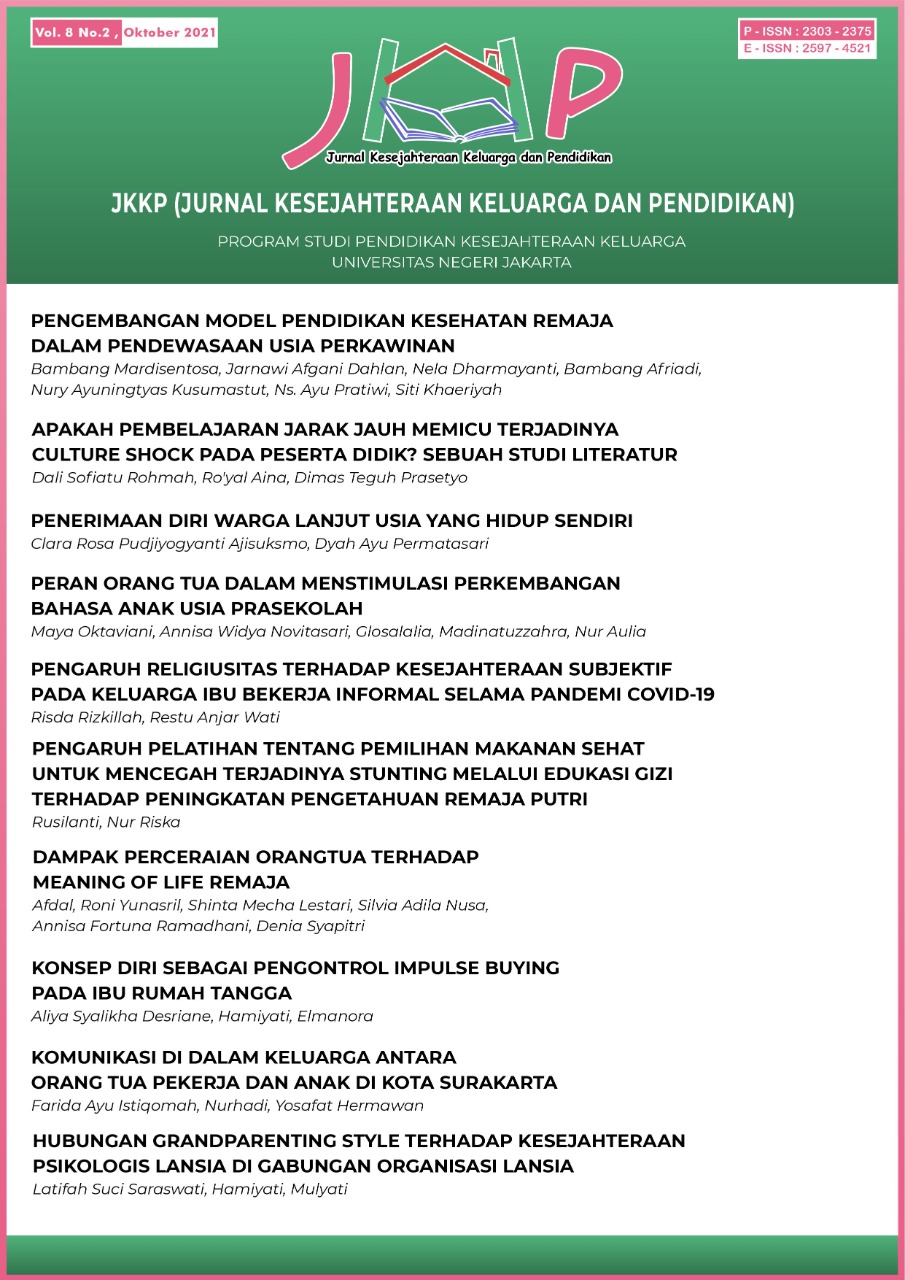KOMUNIKASI DI DALAM KELUARGA ANTARA ORANG TUA PEKERJA DAN ANAK DI KOTA SURAKARTA
DOI:
https://doi.org/10.21009/JKKP.082.09Keywords:
Family Communication, Parenting, Socialization, Sociology of Famliy, Working ParentsAbstract
This study describes how the communication carried out by working parents and children in the family in the city of Surakarta. This study uses two kinds of data collection techniques, namely quantitative and qualitative. Qualitative data was obtained through an interview process while quantitative data was obtained through a survey of children from working families and parents who are workers. The results showed that most of the working parents were able to carry out their dual roles. Even though they don't have much time to see each other, working parents can still communicate with their children. The communication that exists between working parents and children is interpersonal communication that occurs directly and face to face. In addition, working parents and children use communication tools and social media to communicate when they cannot meet in person. Communication that exists between workers' parents and children can be verbal and nonverbal. With the busyness that parents have, they are still able to take the time to control and socialize their children. In other cases, there are parents who only focus on the purpose of meeting the needs of their children economically, thus ignoring the importance of intimate communication with children in the family. The better the communication parents provide, the better the impact on the child. Likewise, if communication is not going well in the family, it will have a bad impact on the child.
Abstrak
Penelitian ini mendeskripsikan bagaimana keberjalanan komunikasi yang dilakukan oleh orang tua pekerja dan anak di dalam keluarga di Kota Surakarta. Penelitian ini menggunakan dua macam teknik pengambilan data yaitu kuantitatif dan kualitatif. Data kualitatif diperoleh melalui proses wawancara sementara data kuantitatif diperoleh melalui survei terhadap anak yang berasal dari keluarga bekerja dan orang tua yang merupakan seorang pekerja. Hasil penelitian menunjukkan bahwa sebagian besar orang tua bekerja mampu menjalankan peran ganda yang dimilikinya. Meski tidak banyak waktu yang dimiliki untuk saling bertemu, orang tua pekerja tetap dapat mampu menjalin komunikasi dengan anak. komunikasi yang terjalin di antara orang tua pekerja dan anak merupakan komunikasi interpersonal yang terjadi secara langsung dan tatap muka. Selain itu orang tua pekerja dan anak memanfaatkan alat komunikasi dan media sosial untuk berkomunikasi di saat tidak dapat bertemu secara langsung. Komunikasi yang terjalin antara orang tua pekerja dan anak dapat berupa verbal dan juga nonverbal. Dengan kesibukan yang dimiliki orang tua tetap mampu meluangkan waktu untuk melakukan kontrol dan sosialisasi terhadap anak. Dalam kasus lain terdapat orang tua yang hanya berfokus pada tujuan memenuhi kebutuhan anak secara ekonomi saja sehingga mengabaikan pentingnya keintiman komunikasi dengan anak di dalam keluarga. Semakin baik komunikasi yang orang tua pekerja berikan, maka semakin berdampak baik pula bagi diri anak. begitu pula sebaiknya, apa bila komunikasi kurang berjalan baik di dalam keluarga, maka akan berdampak kurang baik pula bagi anak.
Downloads
Published
Issue
Section
License
Authors who publish with this Journal agree to the following terms:
- Author retain copyright and grant the journal right of first publication with the work simultaneously licensed under a creative commons attribution licensethat allow others to share the work within an acknowledgement of the work’s authorship and initial publication of this journal.
- Authors are able to enter into separate, additional contractual arrangementfor the non-exclusive distribution of the journal’s published version of the work (e.g. acknowledgement of its initial publication in this journal).
- Authors are permitted and encouraged to post their work online(e.g. in institutional repositories or on their websites) prior to and during the submission process, as it can lead to productive exchanges, as well as earlier and greater citation of published works.
Users/public use of this website will be licensed to CC BY SA
![]()







